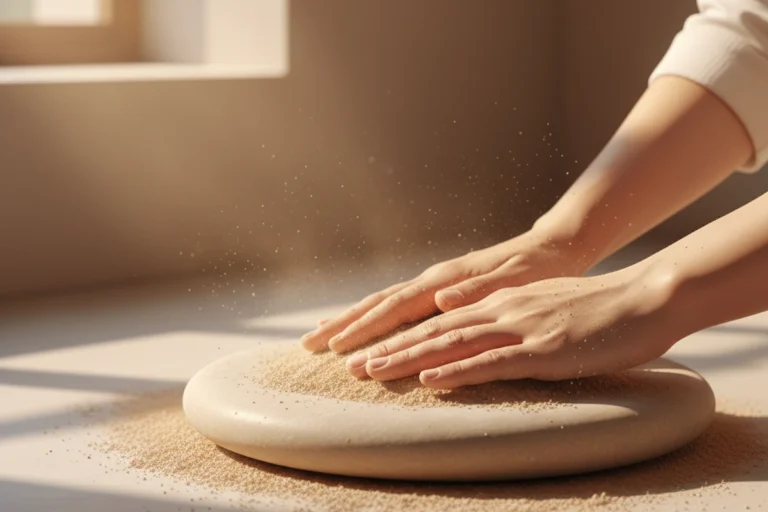Tahajjud – the night prayer – is one of the most beautiful and spiritually powerful acts of worship in Islam.
When the world sleeps and silence surrounds the night, a believer stands before Allah in deep humility, seeking forgiveness, mercy, and closeness to the Creator.
Tahajjud is not just a prayer; it’s an intimate conversation with Allah (SWT).
It’s the time when duas are most likely to be accepted, and hearts find true peace.
The Prophet Muhammad (ﷺ) used to perform it regularly, and it was one of the most beloved acts of worship to him.
In this guide, you’ll learn the meaning of Tahajjud, its best time, how to perform it step-by-step, and the duas that bring you closer to Allah during these blessed hours.
What is Tahajjud Prayer?

Tahajjud (تَهَجُّد) comes from the Arabic root word “hajada” (هجد), which means to stay awake at night.
Thus, Tahajjud literally means “the prayer performed after awakening from sleep at night.”
It is a voluntary (nafl) prayer, offered after the obligatory ‘Isha prayer and before Fajr.
Unlike the five daily prayers, Tahajjud is not compulsory — but it holds immense spiritual rewards and is a sign of true devotion and faith.
Qur’anic Reference
Allah ﷻ praises those who wake up at night for worship in the Qur’an:
“And those who spend part of the night to their Lord prostrating and standing in prayer.”
(Surah Al-Furqan, 25:64)
And in another verse:
“And during a part of the night, pray Tahajjud beyond what is obligatory for you; perhaps your Lord will raise you to a praised station.”
(Surah Al-Isra, 17:79)
These verses show how Tahajjud connects a believer’s heart to Allah, lifting him spiritually and granting him peace and honor.
See Also: The Six Kalimas in Islam
Best Time to Pray Tahajjud Prayer
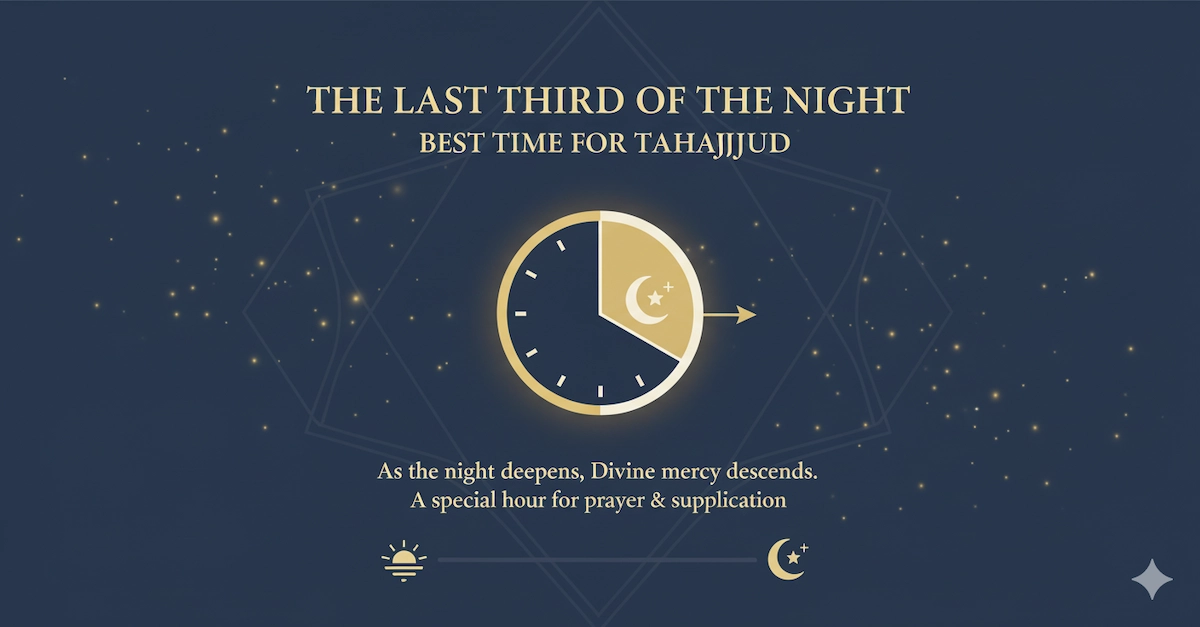
Tahajjud can be prayed any time after ‘Isha and before Fajr, but the best and most rewarding time is during the last third of the night — when Allah descends to the lowest heaven and calls His servants to seek His mercy and forgiveness.
It’s the time when the world is quiet, hearts are calm, and the believer’s soul is most connected to the Creator.
When Does the “Last Third of the Night” Begin?
To understand it easily, divide the night between Maghrib and Fajr into three equal parts.
The final one-third portion is considered the most blessed period for Tahajjud.
For example:
| Example | Maghrib | Fajr | Total Night Hours | Last Third Starts | Best Time for Tahajjud |
|---|---|---|---|---|---|
| Winter | 6:00 PM | 5:00 AM | 11 hours | 1:40 AM | 1:40 AM – 4:50 AM |
| Summer | 7:00 PM | 4:30 AM | 9.5 hours | 1:10 AM | 1:10 AM – 4:20 AM |
So, roughly between 1 AM and 4 AM (depending on season and region) is the ideal window for Tahajjud Prayer.
Why This Time Is So Special
- Allah’s Mercy Descends:
The Prophet (ﷺ) said: “Our Lord descends to the lowest heaven during the last third of the night and says:
‘Who is calling upon Me so that I may answer him?
Who is asking Me so that I may give him?
Who is seeking forgiveness so that I may forgive him?’”
(Sahih al-Bukhari 1145, Sahih Muslim 758) This hadith clearly shows that dua made in this period is rarely rejected. - Peaceful Silence:
The mind is calm, distractions are gone, and concentration in prayer becomes deeper. - Sincerity Increases:
Since no one else is watching, your worship is purely for Allah — free from showing off.
Praying Earlier in the Night (When You Can’t Wake Up Later)
If waking up late is difficult, you can still gain reward by praying Tahajjud before sleeping, after ‘Isha.
It’s valid and accepted, though the reward of the last third is higher.
The Prophet (ﷺ) said:
“Whoever fears that he may not get up at the end of the night, let him pray Witr in the first part of it; and whoever hopes to get up at the end of it, let him pray Witr then, for prayer at the end of the night is witnessed (by the angels), and that is better.”
(Sahih Muslim 755)
So even if you pray earlier, your intention matters — and Allah appreciates every sincere effort.
| Type of Time | When | Reward Level |
|---|---|---|
| After ‘Isha before sleep | Early night | Good |
| After midnight | Middle of the night | Better |
| Last third of the night | Around 1 AM – 4 AM | Best & most rewarded |
In short:
The last third of the night is the golden moment — a time of divine mercy, answered prayers, and inner tranquility.
Standing in Tahajjud during this time is one of the greatest signs of sincere faith.
See Also: Adhan in Arabic, English
How Many Rakats in Tahajjud?
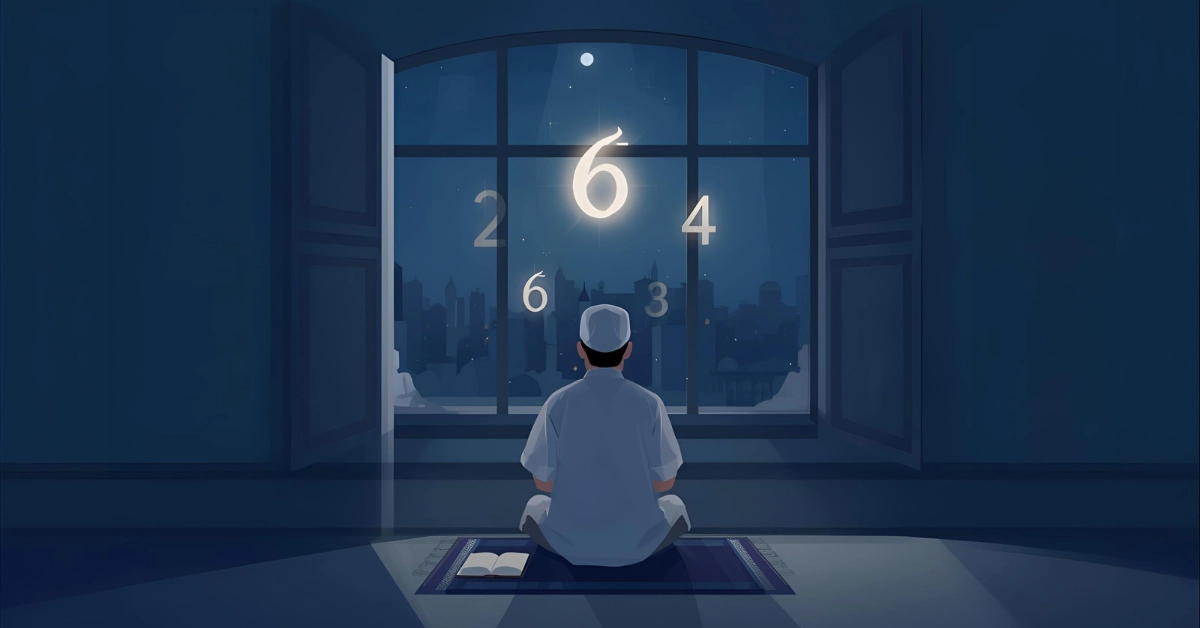
Tahajjud is a nafl (voluntary) prayer, which means there is no fixed number of rakats — you can pray as few or as many as you are able to.
However, the Prophet Muhammad (ﷺ) showed us a beautiful and consistent pattern that we can follow for maximum reward.
Minimum Number of Rakats
The minimum for Tahajjud is two rakats.
Even if you wake up close to Fajr time and only manage to pray two rakats sincerely, it is accepted and beloved to Allah.
The Prophet (ﷺ) said:
“When any one of you gets up at night and prays, let him start with two short rak‘ahs.”(Sahih Muslim 768)
This shows that even two short units of prayer at night hold great value.
Sunnah Number of Rakats (Prophet’s Practice)
According to authentic hadith, the Prophet Muhammad (ﷺ) usually prayed 8 rakats of Tahajjud, followed by 3 rakats of Witr, making a total of 11 rakats.
Aisha (رضي الله عنها) reported:
“The Messenger of Allah (ﷺ) used to pray eleven rak‘ahs at night. He would pray four, do not ask about their beauty and length, then four, do not ask about their beauty and length, and then pray three (Witr).”(Sahih al-Bukhari 1147, Sahih Muslim 738)
So, 8 rakats Tahajjud + 3 Witr = 11 rakats total
This is the most recommended (Sunnah) way, but not compulsory.
You Can Pray More or Less
Tahajjud is flexible — it depends on your energy, time, and sincerity.
| Type | Rakats | Description |
|---|---|---|
| Minimum | 2 | Short but sincere prayer — highly rewarded |
| Common Sunnah | 8 + 3 (Witr) | Prophet’s regular practice |
| Extended Worship | 12, 14, or more | As much as you wish — no upper limit |
The Prophet (ﷺ) said:
“The night prayer is offered as two rak‘ahs followed by two rak‘ahs. If you fear dawn is near, then pray one rak‘ah as Witr to make the number odd.”(Sahih al-Bukhari 990, Sahih Muslim 749)
So you can pray:
- 2 + 2 + 2 + 2 + 3 (Witr), or
- 4 + 4 + 3 (Witr), or
- Even 2 + 3 (short version)
All are acceptable and rewarded.
How to End With Witr
It’s Sunnah to end your night prayer with Witr — the odd-numbered prayer that closes all nightly worship.
You can pray Witr immediately after Tahajjud or before sleeping if you think you might not wake up later.
| Level | Rakats | Witr | Total | Reward |
|---|---|---|---|---|
| Basic | 2 | 1 | 3 | Accepted and beloved |
| Sunnah | 8 | 3 | 11 | Prophet’s consistent practice |
| Extended | 10–12 | 1–3 | 11–15 | Extra reward, depends on devotion |
💖 In essence:
Tahajjud is not about the quantity of rakats but the quality of your connection* with Allah.
Even two sincere rakats in the quiet of the night can change your heart, your life, and your destiny.
See Also: Dua-e-Qunoot in Arabic
How to Pray Tahajjud Prayer Step by Step
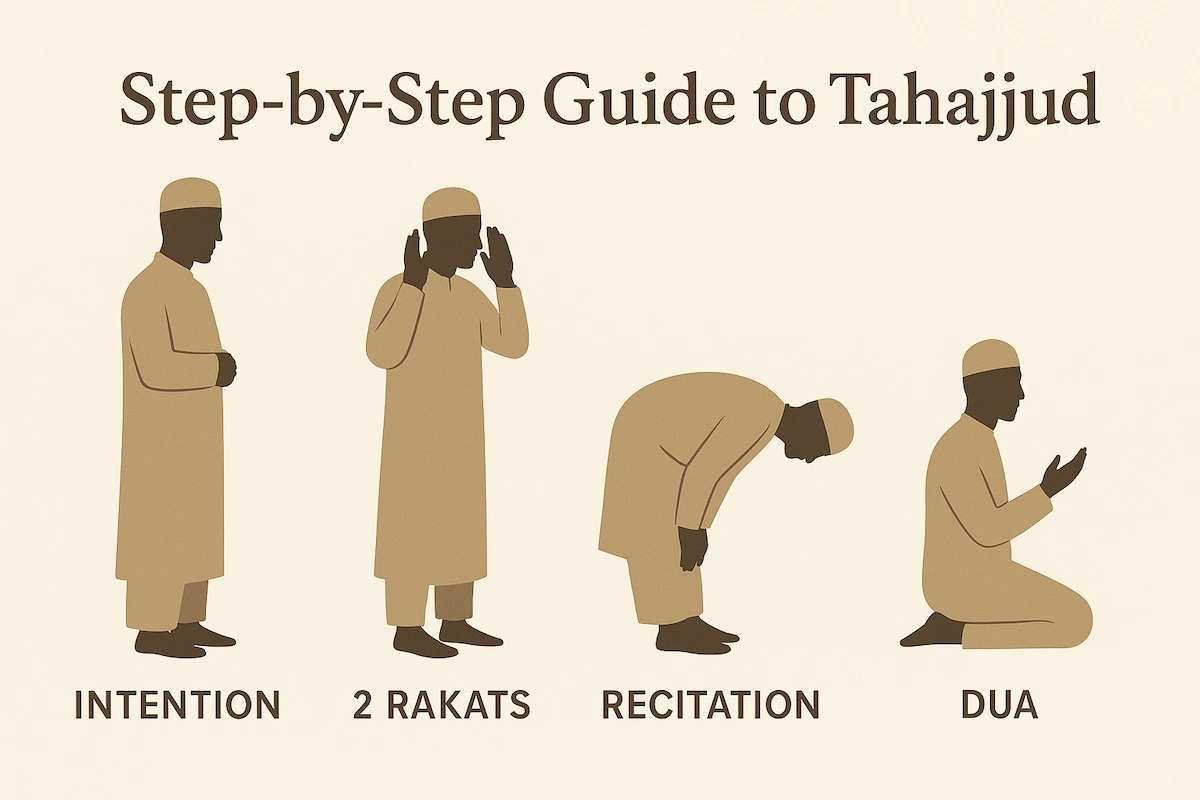
Tahajjud Prayer is one of the most powerful acts of worship in Islam. It brings you closer to Allah, strengthens your faith, and opens the doors of mercy and forgiveness.
Here is a complete step-by-step guide to perform Tahajjud correctly according to the Sunnah.
1. Sleep and Wake Up After Midnight
Tahajjud can only be prayed after sleeping for a short while and before Fajr (dawn).
- The best time is in the last third of the night — just before Fajr.
- Example: If Maghrib is at 6 PM and Fajr at 6 AM → last third starts around 2 AM.
- So, 2:00 AM to 5:30 AM is the most blessed time.
The Prophet (ﷺ) said:
“Our Lord descends to the lowest heaven every night during the last third of the night and says: Who is calling upon Me so that I may answer him?”(Sahih al-Bukhari 1145, Sahih Muslim 758)
2. Make Wudu (Ablution)
Perform a clean wudu before you begin prayer.
You can also apply light perfume (if praying alone) and wear clean clothes — this shows respect and humility before Allah.
A pure body brings a pure heart in Salah.
3. Make the Intention (Niyyah)
You don’t have to say the intention aloud.
Just decide in your heart that you are praying Tahajjud for the sake of Allah.
Example (in English meaning):
“I intend to pray two rakats of Tahajjud for Allah, seeking His mercy and forgiveness.”
4. Begin Your Prayer (2 Rakats Minimum)
Tahajjud is prayed in sets of two rakats each — just like any other nafl prayer.
Step-by-Step:
- Say Takbeer: “Allahu Akbar” and fold your hands.
- Recite Surah Al-Fatihah.
- Then recite any Surah (many prefer Al-Ikhlas, Al-Mulk, Al-Sajdah, or long Surahs).
- Complete one rakat (ruku’ and sujood).
- Stand up for the second rakat, repeat Surah Al-Fatihah and another Surah.
- Finish with Tashahhud and Salam.
That’s 2 rakats — one complete unit of Tahajjud.
5. Pray More If You Wish (2 by 2)
You can continue praying in pairs (2 by 2) as much as you like.
- Common Sunnah: 8 Rakats Tahajjud + 3 Rakats Witr
- Minimum: 2 Rakats Tahajjud + 1 Rakat Witr
- You can pray: 2, 4, 6, 8, 10, or more — it’s flexible.
The Prophet (ﷺ) said:
“The night prayer is offered as two rak‘ahs followed by two rak‘ahs. Then pray one (rakat) Witr.”(Sahih al-Bukhari 990, Sahih Muslim 749)
6. Recite Long Surahs or Verses (Optional but Recommended)
Tahajjud is best when recited slowly and with reflection.
If possible, choose long Surahs — or recite the short ones with understanding and emotion.
Some beautiful Surahs often recited in Tahajjud:
- Surah Al-Mulk (67)
- Surah As-Sajdah (32)
- Surah Al-Insan (76)
- Surah Al-Ikhlas (112)
- Surah Al-Falaq (113)
- Surah An-Nas (114)
7. End With Witr Prayer
It’s Sunnah to end the night with Witr, an odd-numbered prayer (1, 3, or 5 rakats).
If you already prayed Witr earlier, you don’t need to repeat it.
The Prophet (ﷺ) said:
“Make the last of your night prayer Witr.”(Sahih al-Bukhari 998)
8. Reflect and Remember Allah
After finishing Tahajjud, take a few moments to sit and do dhikr or istighfar.
You can say:
- Astaghfirullah (I seek forgiveness from Allah)
- SubhanAllah, Alhamdulillah, Allahu Akbar
- Send salawat upon the Prophet ﷺ
This keeps your heart connected and fills your soul with peace.
🌺 In essence:
Tahajjud is not just a prayer — it’s an intimate conversation between you and Allah in the quiet of the night.
Even two rakats, prayed with sincerity and tears, can bring peace, forgiveness, and blessings beyond imagination.
See Also: The 4 Farz in Wudu
Tahajjud Dua in Arabic, Transliteration & Meaning

Tahajjud is the best time to connect deeply with Allah.
In these quiet hours of the night, your dua (supplication) is most likely to be accepted, as Allah Himself descends to the lowest heaven and listens to those who call upon Him.
The Prophet (ﷺ) said:
“Our Lord descends to the lowest heaven during the last third of every night and says: ‘Who is calling upon Me so that I may answer him? Who is asking of Me so that I may give him? Who is seeking My forgiveness so that I may forgive him?”(Sahih al-Bukhari 1145, Sahih Muslim 758)
1. Short Comprehensive Tahajjud Dua (from the Sunnah)
Arabic:
اللَّهُمَّ اغْفِرْ لِي، وَارْحَمْنِي، وَاهْدِنِي، وَعَافِنِي، وَارْزُقْنِي
Transliteration:
Allahummaghfir li, warhamni, wahdini, wa ‘afini, warzuqni
English Meaning:
“O Allah, forgive me, have mercy on me, guide me, grant me health, and provide me with sustenance.”
When to Read:
You can recite this dua during or after your Tahajjud prayer, especially while in sujood (prostration) — the position where you are closest to Allah.
2. Dua for Forgiveness and Mercy
Arabic:
اللَّهُمَّ إِنِّي ظَلَمْتُ نَفْسِي ظُلْمًا كَثِيرًا، وَلَا يَغْفِرُ الذُّنُوبَ إِلَّا أَنْتَ، فَاغْفِرْ لِي مَغْفِرَةً مِنْ عِندِكَ، وَارْحَمْنِي، إِنَّكَ أَنْتَ الْغَفُورُ الرَّحِيمُ
Transliteration:
Allahumma inni zalamtu nafsi zulman kathiran, wa la yaghfiru adh-dhunuba illa anta, faghfir li maghfiratan min ‘indika, warhamni, innaka anta al-Ghafur ar-Rahim
English Meaning:
“O Allah, I have wronged myself greatly, and none forgives sins except You. So forgive me with a forgiveness from You, and have mercy on me. Indeed, You are the Most Forgiving, Most Merciful.”
(Sahih al-Bukhari 834, Muslim 2705)
When to Read:
After completing Tahajjud — while sitting quietly and reflecting on your sins and Allah’s mercy.
3. Dua for Guidance and Strength
Arabic:
اللَّهُمَّ اجْعَلْنِي مِنَ التَّوَّابِينَ وَاجْعَلْنِي مِنَ الْمُتَطَهِّرِينَ
Transliteration:
Allahumma aj‘alni mina at-tawwabeen, waj‘alni minal-mutatahhirin
English Meaning:
“O Allah, make me among those who repent often and among those who purify themselves.”
When to Read:
After making wudu before Tahajjud or in sujood — it strengthens your intention and purifies the heart.
4. Personal Dua (in Your Own Words)
After reciting Sunnah duas, you can make your own heartfelt supplication in any language.
Speak to Allah directly — like a child speaking to a loving parent.
Ask Him for:
- Forgiveness for your sins
- Protection from harm and evil
- Health, peace, and sustenance (rizq)
- Guidance for yourself and your family
- Jannah (Paradise) and the pleasure of Allah
Tip:
Raise your hands, face the Qiblah, and call upon Allah with humility and sincerity.
Begin your dua with praise (Alhamdulillah) and salawat (Allahumma salli ‘ala Muhammad), and end the same way.
Example of a Personal Tahajjud Dua
“O Allah, I stand before You in the silence of the night.
You know my fears, my pain, and my dreams.
Forgive my past, bless my present, and guide my future.
Grant me peace in my heart and light in my path.
Make me among those who remember You in ease and in hardship.”
| Type | Arabic | When to Read | Purpose |
|---|---|---|---|
| Forgiveness & Rizq | اللَّهُمَّ اغْفِرْ لِي، وَارْحَمْنِي… | During/after prayer | General blessings |
| Forgiveness for Sins | اللَّهُمَّ إِنِّي ظَلَمْتُ نَفْسِي… | After prayer | Mercy & repentance |
| Purification | اللَّهُمَّ اجْعَلْنِي مِنَ التَّوَّابِينَ… | Before or during | Inner purity |
| Personal Dua | In any language | Anytime | Connection with Allah |
In essence:
The night of Tahajjud is your private audience with Allah — your chance to speak, ask, cry, and be heard.
No dua made at that time goes unanswered; it is either fulfilled, delayed for your benefit, or stored for you in Jannah.
See Also: The 6 Farz in Namaz
Benefits of Tahajjud Prayer
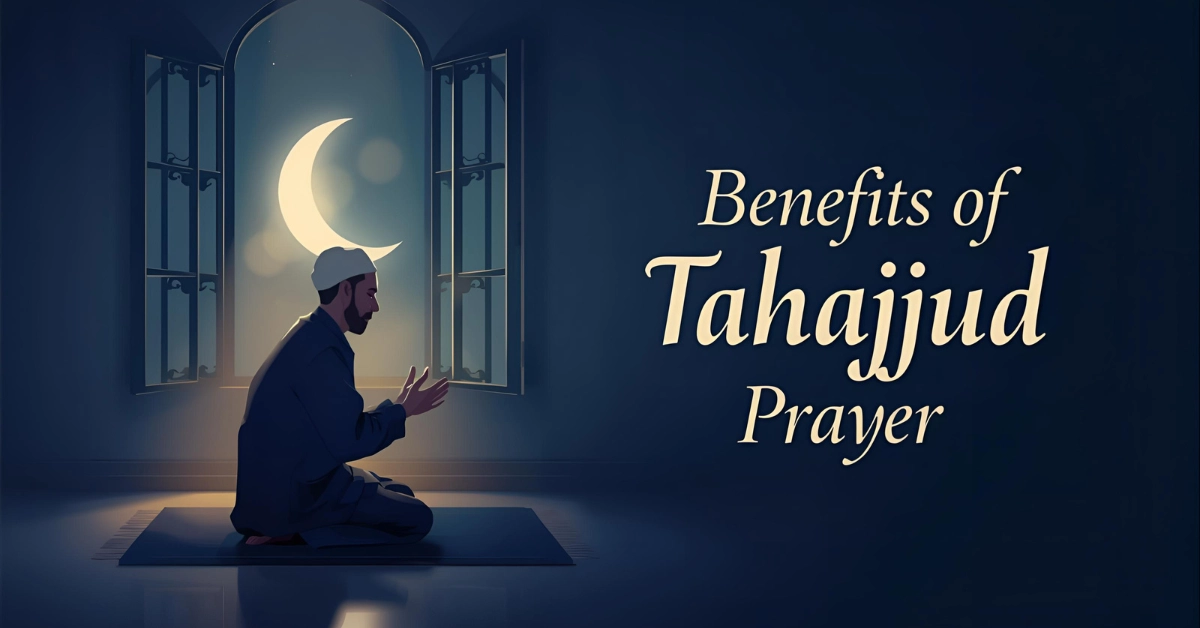
Tahajjud is not just a prayer — it’s a spiritual experience that transforms your heart, mind, and body.
Allah praises those who perform it, calling them His special servants:
“They arise from their beds to invoke their Lord in fear and hope, and they spend (in charity) from what We have provided them.”
Surah As-Sajdah (32:16)
Let’s explore its benefits in three dimensions 👇
1. Spiritual Benefits
- Closeness to Allah:
In the quiet of the night, when the world sleeps, you are alone with your Creator. This intimate time builds a deep personal connection with Allah. - Forgiveness and Mercy:
The last third of the night is the time when Allah Himself asks, “Is there anyone seeking forgiveness so that I may forgive him?” (Sahih Muslim 758) - Strengthened Iman (Faith):
Regular Tahajjud keeps the heart alive and firm in faith. It makes you spiritually strong and consistent in worship. - Acceptance of Dua:
Duas made during Tahajjud are among the most accepted — especially those whispered with sincerity and tears.
2. Emotional and Psychological Benefits
- Inner Peace and Calmness:
Tahajjud relieves stress and anxiety. Speaking to Allah before dawn brings emotional healing and tranquility. - Confidence and Hope:
It gives you strength to face life’s challenges, knowing that Allah listens and responds. - Self-Discipline:
Waking up early at night teaches patience, focus, and consistency — traits of successful believers. - Emotional Healing:
Those who pray Tahajjud regularly often describe it as a cure for sadness, heartbreak, and loneliness.
3. Physical and Health Benefits
- Better Sleep Cycle:
Sleeping early and waking for Tahajjud aligns with the natural body rhythm, improving sleep quality. - Mental Clarity:
The peaceful hours before dawn refresh the mind and improve concentration. - Reduced Stress Hormones:
Night prayer lowers stress levels and promotes calm breathing — beneficial for the heart and brain. - Blessings in Daily Routine:
People who pray Tahajjud often find their days more productive, their time more blessed, and their tasks easier.
See Also: When is Sajda-e-Sahw performed
Common Questions About Tahajjud

Let’s answer some of the most frequent questions people ask about this beautiful prayer.
Can I Pray Tahajjud After Isha and Before Sleeping?
Technically, yes — you can pray any nafl prayer after Isha and it will be rewarded.
But to be counted as Tahajjud, you should sleep first, even for a short while, and then wake up for it.
If you fear you won’t wake up later, it’s better to pray before sleeping — and Allah still rewards you.
The Prophet ﷺ said:
“Whoever fears that he may not get up in the last part of the night should offer Witr before sleeping; and whoever hopes to get up may offer it after (waking), for prayer at that time is witnessed (by the angels).”(Sahih Muslim 755)
Can Women Pray Tahajjud?
Absolutely yes — women can and should pray Tahajjud.
There is no gender restriction.
They can pray at home in a clean and quiet place, at any time during the last part of the night.
Tahajjud is equally rewarded for both men and women.
Allah says:
“Indeed, Muslim men and Muslim women… those who remember Allah much — for them Allah has prepared forgiveness and a great reward.”
(Surah Al-Ahzab 33:35)
What If I Miss Tahajjud?
If you miss it unintentionally (overslept or were sick), you can make it up after sunrise (Duha time).
The Prophet (ﷺ) said if someone is unable to pray at night, they can pray the same number of rakats during the day, and Allah still rewards them.
(Sahih Muslim 747)
Also, ask Allah to help you wake up next time — consistency matters more than perfection.
See Also: Dua for after Wudu in Arabic, English
Tips to Wake Up for Tahajjud

Waking up for Tahajjud may be difficult at first, but with a few lifestyle adjustments and pure intention, it becomes easy and natural.
Sleep Early and Intentionally
Go to bed soon after Isha with the intention to wake for Tahajjud.
Even a small nap before midnight helps you wake up more refreshed.
Set Multiple Alarms
Use your phone, a clock, or even family reminders.
Place the alarm far from your bed so you have to get up to turn it off.
Make Wudu Immediately
Cold water wakes the body and refreshes the mind.
The Prophet (ﷺ) used to praise those who perform wudu in difficulty, saying:
“No one performs wudu in hardship except that his sins fall away.” (Muslim 251)
Encourage Family or a Friend
When you wake someone else for Tahajjud, it creates a habit and motivation for both.
The Prophet ﷺ would wake Aisha (رضي الله عنها) gently for night prayer.
Make Dua for Allah’s Help
Ask Allah to give you the strength and desire to wake up.
When He sees sincerity, He will help you rise easily.
“You will not wake up by your willpower alone — you wake up because Allah wants to meet you.”
Conclusion
Tahajjud is not just an extra prayer — it’s a journey of the heart.
It’s the time when the soul whispers to its Creator and finds peace that the world cannot offer.
- It purifies your heart.
- Strengthens your faith.
- Fills your life with barakah (blessings).
- And connects you directly to Allah’s mercy.
Even if you start with just two rakats a few times a week, keep it consistent.
Over time, you’ll feel the light, peace, and strength that only those who stand in the night experience.
“And the servants of the Most Merciful are those who spend part of the night in worship of their Lord, prostrating and standing.”
Surah Al-Furqan (25:64)
All images in this post are not actual photographs. They are digital illustrations created to symbolize the beauty and spirituality of Tahajjud prayer.



